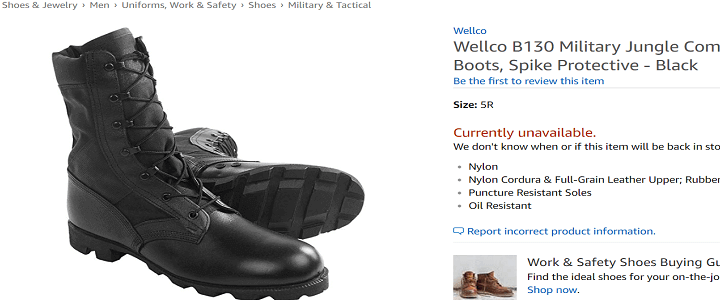Yesterday the legal news came fast and furious. The president’s former lawyer Michael Cohen pleaded guilty to eight counts, including campaign finance violations, in which he implicated the president himself. A jury found Paul Manafort, long-time lobbyist and consultant who was, for a time, the chairman of President Donald Trump’s campaign, guilty of eight counts of tax evasion, while failing to reach a verdict on 10 more counts. And late in the day, the Justice Department announced the indictment of Congressman Duncan Hunter, Jr., and his wife, who the DOJ accuses of converting “more than $250,000 in campaign funds to pay for personal expenses,” and falsifying campaign finance records to hide that fact.
Contractor Gets jail time for defrauding the government
That’s a busy afternoon, but let’s leave all that for another time. Because amidst all the political fighting and pulling of security clearances, you probably missed the final act of a drama that you didn’t even realize had been happening. Thank you to the Military Times for bringing to our attention the fact that 66-year-old Vincent Lee Ferguson, the president and chief executive officer of Wellco Enterprises, Inc. and its corporate parent Tactical Holdings Operations, Inc., will be spending the next 41 months in federal prison for defrauding the government.
With little fanfare, Ferguson received his sentence in the United States District Court for the Eastern District of Tennessee on August 6. Ferguson and his two sons, Matthew and Kerry had pleaded guilty in February to conspiracy to commit wire fraud. Two other Wellco executives – Ferguson’s daughter Stephanie Kaemmerer, and Neil Streeter who served as Wellco’s vice president of government contracting – previously pleaded guilty to smuggling goods into the United States.
Unlike many federal crimes that are part of a nebulous “conspiracy to defraud the government,” this case actually involved actual fraud in a government procurement. Wellco, inventor of the “jungle boot” made famous in Vietnam, is one of the main providers of combat boots to the U.S. military. The company sold more than $138 million worth of boots to the government between 2006 and 2012.
Rip off those “made in china” labels
A word to the wise: if you sit on a corporate board of directors, and the person you recently hired as your president and CEO presents a “turnaround plan” that involves deliberately defrauding the government…find another CEO immediately. You will get caught, and someone (possibly you) will go to jail. It happens all the time.
In this case, Ferguson proposed manufacturing boots (or at least parts of them) in China, but passing them off as “Made in the U.S.A.” According to the government’s statements, Ferguson had the Chinese manufacturers sew “USA” labels into the boots. Two shipments of those boots never got past customs; Customs and Border Patrol agents seized them at the port of entry.
Ferguson then had the factory sew-in a “Made in China” label that workers in Wellco’s Morristown, Tenn. Factory could tear off before shipping them to the government. Wellco sold Uncle Sam at least $8.1 million of these bogus American boots.
Misrepresenting a commercial item as being made in the U.S. is illegal under the Federal Trade Commission Act. Not only must all imported items bear the name of their country of origin, there are strict standards regarding what can and cannot be labeled as made in the U.S. The Federal Trade Commission says a “product advertised as Made in USA [must] be ‘all or virtually all’ made in the U.S.” Since 1997, the FTC has also allowed “qualified claims,” pioneered by athletic shoe company New Balance, which uses this exemption to label shoes with at least 70 percent domestic content as American-made. (The shoe that New Balance is trying to sell the government, however, is Berry Amendment-compliant, meaning it is 100 percent American-made).
The Berry Amendment
That law, the Berry Amendment, means that when selling goods to the military, the qualified claim isn’t good enough. Certain products must me wholly made in the U.S.A.
Congress originally enacted the Berry Amendment in 1941 to ensure American troops were clothed and fed only with American products. It was an amendment to the 1933 “Buy American Act,” an early New Deal law that is the original “domestic preference statute” in federal procurement law. Most economists, and most politicians these days, don’t like protectionism. But according to a 2014 Congressional Research Service report on the law, it was shamelessly intended “to protect the U.S. industrial base during periods of adversity and war.”
Following the mini-scandal surrounding the procurement of black berets from China in 2001, congress reaffirmed the law, permanently enshrining it in the U.S. Code. The Berry Amendment stipulates simply that the DOD may not purchase any food, clothing (and the materials used to make the clothing), tents, or other textiles that were not “grown, reprocessed, reused, or produced in the United States.”
Representing foreign-made goods as American-made would qualify, at the very least, as a False Claims Act violation, since the vendor certifies that the products conform with all contract provisions. That would expose the company monetarily to treble damages. But rather than go that route, the government went for the wire fraud charges, which unlike FCA violations, carry jail time.
So contractors, ask yourself: is it worth it?
(Hint, hint… no, it’s not).




